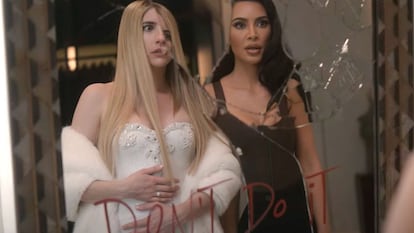‘American Horror Story: Delicate,’ or when motherhood becomes a nightmare
New showrunner Halley Feiffer takes over the classic horror series and produces an exquisite reimagining of ‘Rosemary’s Baby’

The new season of American Horror Story, a long-running horror series created by Ryan Murphy and Brad Falchuk in 2011, is marked by two unprecedented events (for AHS). First, Murphy and Falchuk have handed over the creative reins to Halley Feiffer, an award-winning playwright and cult-film actress known for her work on Broadway and in films by Noah Baumbach. And for the first time, an AHS season is based on a novel, one that puts a twist on Ira Levin’s classic Rosemary’s Baby (made into a film by Roman Polanski in 1969).
The 12th season of AHS is adapted from Delicate Condition, a novel by Danielle Valentine about Anna Alcott, an indie actress desperate to have a child. Played by Emma Roberts with just the right touch of naivety, desire and ambition, Anna undergoes a grueling in-vitro fertilization (IVF) treatment. But things start to go terribly wrong and not even her husband (played by none other than Matt Czuchry of Gilmore Girls fame) is willing to believe that someone is playing twisted games with her.
Since its start in 2011, this franchise has aimed to showcase an American brand of horror. Murphy and Falchuk, who previously co-created the boundary-pushing Nip/Tuck, have always strived to innovate with AHS. It practically created its own subgenre within the diverse horror landscape by exploring racial and neurodiversity themes, and featuring queer characters and older women in unexpected roles. The series has also embraced a visually stunning aesthetic that reimagines even the most clichéd tropes.
The American Horror Story anthology has maintained continuity through series mainstays like Sarah Paulson, Evan Peters, Lily Rabe, Frances Conroy and Jessica Lange. Their intersecting paths in various roles have become the true driving forces of each season, as these actors undergo compelling transformations from ghosts and witches to serial killers, freaks and post-apocalypse survivors. The show continuously pushed boundaries, offering a myriad of nuanced characters, while still acknowledging their very real humanity.
Haley Feiffer’s mastery as the showrunner of this illustrious and enigmatic series is remarkable. She skillfully embraces the minimalist cinematography that is so popular these days, sometimes even capturing scenes upside down. Not to mention the exceptional portrayal of characters, particularly the striking duo of black-feathered women who do more than just chase the protagonist. The change in series leadership is seamless and barely noticeable unless you dwell on it. Feiffer’s vision is marked by abundant light and few night scenes, even though several episodes were directed by the dark and brooding Jennifer Lynch.
The story is actually quite simple: there’s a woman who wants something she can’t have, and is manipulated and used by everyone around her. Feiffer uses the human body as a catalyst for the nightmare, reminiscent of Julia Docournau’s (Titane) cinematic style, but without any hidden nods to the French filmmaker. One scene in particular — the one with the hair — is infinitely striking and brings Murphy and Falchuk’s classic tale to a painfully intimate level. The loss of control in the face of an unstable reality, fueled by induced paranoia, adds to the horror.
Macabre fable
The criticism of Hollywood and its ruthless pursuit of fame — consuming stars to fuel the dream factory — takes on a dark, fable-like quality in this season of AHS. Kim Kardashian, playing the role of both agent and best friend to Emma Roberts’ character, is the deceitful temptress who entices the protagonist into a choice between an Oscar and life itself. Anna Alcott (Roberts) has been nominated for an Oscar and must now embark on a promotional tour that means abandoning everything else — even the possibility of motherhood.
Feiffer’s vision presents a domesticated version of the Murphy/Falchuk formula, in which a powerful villain controls the protagonist’s world. The nightmare in this season of AHS is entirely plausible, as Anna Alcott life is manipulated by remote forces who have hacked her mobile phone. It is not social networks that dictate our lives, but rather our acceptance of being enslaved by a system of seemingly personalized systems.
Sign up for our weekly newsletter to get more English-language news coverage from EL PAÍS USA Edition
Tu suscripción se está usando en otro dispositivo
¿Quieres añadir otro usuario a tu suscripción?
Si continúas leyendo en este dispositivo, no se podrá leer en el otro.
FlechaTu suscripción se está usando en otro dispositivo y solo puedes acceder a EL PAÍS desde un dispositivo a la vez.
Si quieres compartir tu cuenta, cambia tu suscripción a la modalidad Premium, así podrás añadir otro usuario. Cada uno accederá con su propia cuenta de email, lo que os permitirá personalizar vuestra experiencia en EL PAÍS.
¿Tienes una suscripción de empresa? Accede aquí para contratar más cuentas.
En el caso de no saber quién está usando tu cuenta, te recomendamos cambiar tu contraseña aquí.
Si decides continuar compartiendo tu cuenta, este mensaje se mostrará en tu dispositivo y en el de la otra persona que está usando tu cuenta de forma indefinida, afectando a tu experiencia de lectura. Puedes consultar aquí los términos y condiciones de la suscripción digital.









































